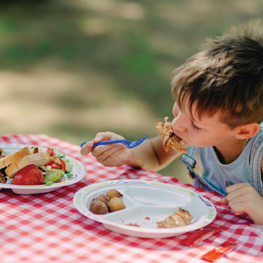
Sleep-away camp is a right of passage for many children today, but deciding when and if to send your child on this journey is difficult. For parents of children with food allergies, the concerns of sending your child to camp become even greater. Navigating the world with a food allergy is often tricky, yet having the same experiences that non-allergic children have is not only important, it is entirely possible.
Keep these four points in mind to help you decide when to allow your allergic child to begin their own journey of independence at camp:
1. Research potential camps carefully. Be prepared to ask the camp a number of questions before you commit. John Parker* whose son is allergic to all tree nuts, peanuts, and chocolate, needed to ask many questions to feel comfortable about his son going to camp. What kind of medical staff does the camp have on-site? What is medical staff’s level of medical training? How far from a major medical centre is the camp? Do they have a formal plan for allergic reactions? Have they ever used it before, and what was the outcome? “Finding out if my child is allowed to carry his own epinephrine all day is very important. If not, and it’s just locked up, then that’s a deal breaker for me,” says John. Research what kinds of foods are served at the camp and if cross-contamination could be an issue. Be proactive in researching the camp so you feel comfortable with the accommodations you think are needed for your child.
Dr. James Sublett, Clinical Professor in Chief of Pediatric Allergy at University of Louisville School of Medicine and Managing Partner of Family Allergy and Asthma says, “If there are signs of a camp blowing off your issue, then choose a different camp; there are lots of choices.” John agrees, “If it doesn’t feel right and you aren’t convinced that they [the camp] get it, then don’t trust your child’s life with them.”
2. Evaluate your child’s allergy history. Take an honest look at your child’s allergy history. Understanding how severe or how frequent your child’s reactions are can help you determine important criteria for camp. “For a child with a history of severe reactions to numerous allergens, I would suggest giving your most serious consideration to camps situated near a major medical centre,” says Dr. Lucy Gibney, mother of a child with severe food allergies.
She also raised these questions to consider about your child: “How clear is your child’s understanding of a reaction and what to do? How experienced is he with being responsible for food issues and allergy management? What is his level of comfort in communicating with peers and adults about allergy matters?” If your child has a great understanding of their food issues and has previously shown responsibility in managing those issues, then they may be ready for camp.
3. Educate the camp staff. Once you’ve committed to a camp, educating the staff about your child’s food allergies is crucial. Even if the staff has had training about food allergies and anaphylactic reactions, always explain how and when to use the epinephrine and what the signs of a reaction look like. “From the time of exposure, if you see a rapid onset of symptoms, within five minutes, it’s likely to be a more severe reaction. When you see two systems or more, like throat hurting, vomiting, then a skin reaction of hives, that’s an indication to use the epinephrine. You’re not going to get into trouble using the epinephrine. The bottom line is that it could save the child’s life,” says Dr. Sublett. “Usually bad outcomes are a result of not getting epinephrine soon enough,” he adds. It’s important for the camp staff or your child to use it right away.
“I always emphasize reading food labels every time. You might discuss with camp staff the possibility of reviewing items yourself when your camper arrives. Remember to discuss risks associated with sharing things that have mouth contact including cups, utensils, horns, and balloons,” says Dr. Gibney. Parents can also find helpful online resources like the Food Allergy and Anaphylaxis Network, foodallergy.org, to provide support materials for educating camps, as well as schools and your own family.
4. Forge good relationships with the camp staff. Creating a friendly and mutually respectful relationship with the camp and food staff can go a long way. People who don’t live with allergies might not understand your serious cause for concern because they don’t know an allergic reaction can be potentially fatal. Make sure you educate them in a respectful, non-intimidating, and non-aggressive way. Having a food allergy can be emotional, so you and your kid(s) should work on how to be assertive without being aggressive.
Only you know what’s best for your child. Researching, asking questions, and educating your child and camp staff will ensure a successful experience for everyone involved. Letting go is difficult. “You may never feel 100 per cent comfortable letting your allergic child maneuver the world on their own, but through education of staff and having confidence that your child knows how to care for himself, normal childhood experiences are possible. It just takes a little planning,” says John.
Jennifer is a mother of three, one of whom has a severe peanut allergy. *John Parker’s last name was changed per his request during the interview.
Calgary’s Child Magazine © 2024 Calgary’s Child